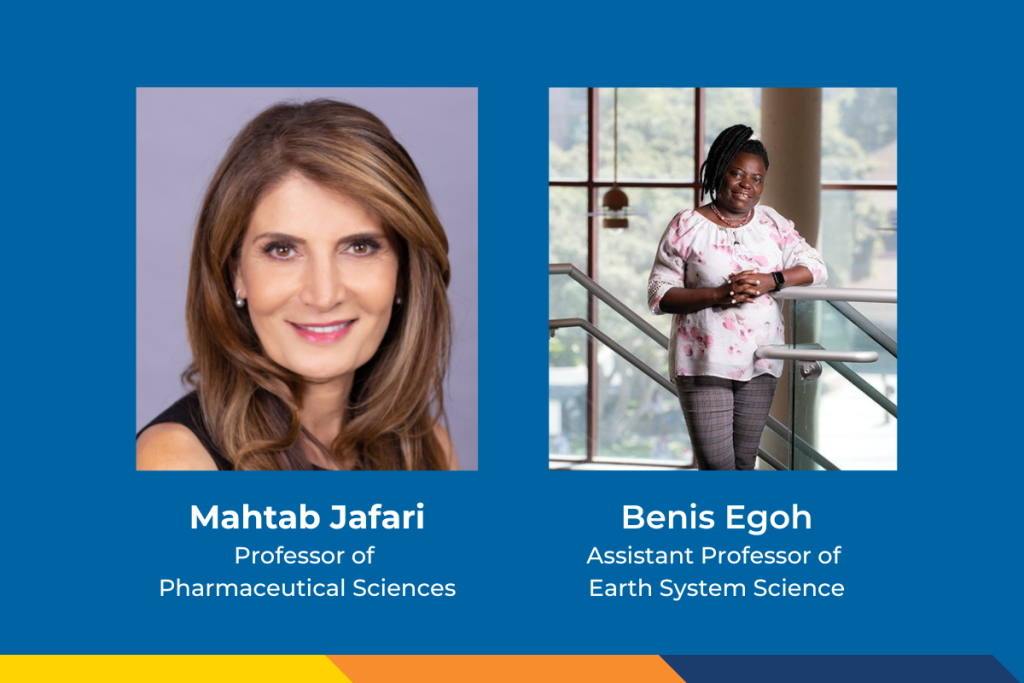Mahtab Jafari Presents on the Importance of Nature Conservation at NASEM Workshop
Mahtab Jafari, PharmD, UC Irvine School of Pharmacy & Pharmaceutical Sciences professor of pharmaceutical sciences and director of the UCI Center for Healthspan Sciences, spoke at a National Academy of Sciences workshop to address the question, “What has been learned about how to integrate public health and nature into research, policy, and practice to foster resilience?”
The workshop hosted research, practitioner, and policy communities along with other stakeholders to explore opportunities to advance understanding of the interconnections between public health and nature and discuss how to move from knowledge to action through better integration of knowledge, policy, and practice.
In her presentation, Jafari pointed out the prevalence of poor mental health among college students, especially since the onset of the COVID-19 pandemic. In 2021, academic success was reduced by 22% due to depression and about 28% due to stress.
Jafari believes nature therapy is a great non-pharmacological intervention underutilized on college campuses; 10-20 minutes of sitting or walking in natural settings can help college students improve their overall mood and mental health.
Nature therapy courses are another intervention resource. The living lab for Jafari’s educational research is Life101: Mental and Physical Self-Care. Created by Jafari at UCI, this module covers the science and practice of nature therapy.
Jafari simultaneously evaluates the impact of nature therapy on her students’ mental health. At UCI, she encourages students to walk through Aldrich Park to practice nature therapy. In the 2020-21 academic year with approximately 2,000 students, Jafari saw a 107% increase in the practice of nature therapy weekly.
Due to its success and popularity, The Life101 course is available to students on all 10 University of California campuses for free.
In her call for action, Jafari emphasized the need for a nature therapy research database, partnerships with communities to educate people who can benefit from nature therapy, and the prioritization of expanding and conserving public green spaces.
Her presentation included a quote from Richard Louv, an American non-fiction author and journalist. “The natural world’s benefits to our cognition and health will be irrelevant if we continue to destroy the nature around us.”
In the next segment of her presentation, Jafari presented on improving human health using botanicals.Many FDA-approved pharmaceutical drugs, traditional medical practices, and botanical supplements come from plants.
In her lab, Jafari works with Rhodiola rosea sourced from Alaska, but noted climate change is affecting arctic ecosystems where it grows.
“I work with botanical extracts, and if we continue at this rate destroying our nature, very soon there will be no natural habitats for medicinal plants to grow,” said Jafari.
Over the past 18 years, using fruit flies and mice as the central model systems in her research laboratory, Jafari has focused on identifying and evaluating botanicals and dietary supplements that extend lifespan and improve healthspan through a science that she introduced as Healthspan Pharmacology.
In addition to Jafari’s presentation, assistant professor Benis Egoh from the UCI the Department of Earth System Science was invited to present on the importance of nature conservation.
“The goal of this workshop was to inform policy change and included participants from the White House,” said Jafari. “I was very proud to be one of two female faculty members invited to present and participate from UCI.”
